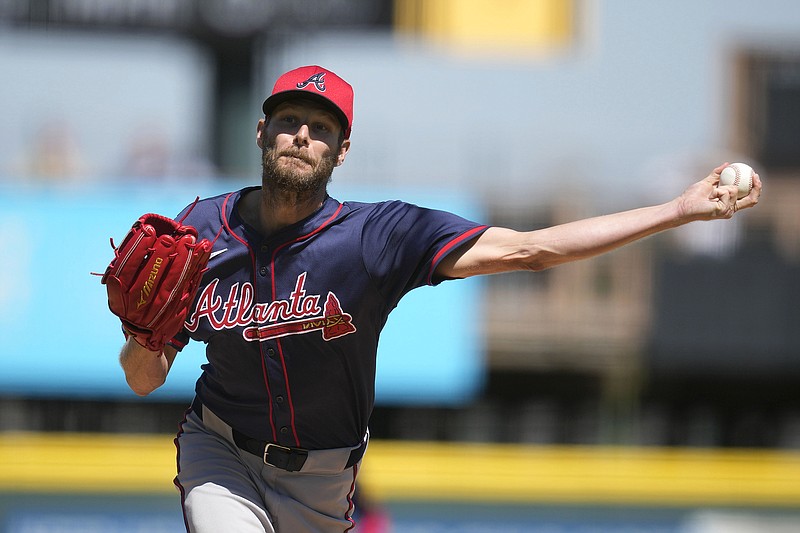Here are three keys for a successful 2024 season — and beyond — for the Atlanta Braves from a fan's perspective:
1. Stay healthy
Every MLB team can list this as a key, but health is incredibly important for this year's Braves because there are no plug-and-play guys in the high minors for a franchise with one of the lowest-rated farm systems in baseball.
The signing of old friend Adam Duvall and the strong spring from Forrest Wall gives the outfield decent depth and insurance in case offseason acquisition Jarred Kelenic's spring struggles continue into the season. Of course, if something happens to Ronald Acuña Jr., well, let's not discuss that.
The infield has one quality backup in Luis Guillorme, though David Fletcher, who will start the season at Triple-A Gwinnett, has experience and some flexibility. There are no feasible backups for Austin Riley and Matt Olson.
Health is just as important for the starting pitching staff and much more of an issue because two-fifths of the rotation consists of 40-year-old Charlie Morton and 35-year-old, oft-injured Chris Sale, not to mention co-ace Max Fried, who is coming off an injury-ravaged season.
There is some mound depth in Bryce Elder, Ian Anderson, Dylan Dodd, Huascar Ynoa and top prospect AJ Smith-Shawver, if and when the need arises.
2. Have fun — but don't be soft
The lasting image of the Braves' latest postseason failure is nemesis Bryce Harper of the Philadelphia Phillies staring down shortstop Orlando Arcia as he rounded second base after hitting a series-turning three-run homer in Game 2 of the teams' National League Division Series.
It wasn't the staredown or the throat-slash gesture that preceded Harper's famous trip around the bases that bothers Atlanta fans the most (Arcia earned it after a locker room comment became public knowledge). It's the way the team reacted during and afterward that haunts us.
Not only did Arcia bow his head, none of his teammates stepped up to have his back from that point on. Respect is one thing. Letting someone disrespect you without consequences on the athletic field is a losing mentality.
The Braves have an elite group — Acuña, Riley, Olson, Ozzie Albies, Michael Harris, et al. — that plays the game with joy. That's a great thing and part of the reason the players are so close. Having fun keeps a team together and helps avoid issues when the inevitable losing streak comes.
What they don't have is anyone with a Harper-like attitude to help give the team an edge when it needs it. Maybe that can be new left fielder Kelenic, or perhaps the effusive Sale.
We may find out next weekend in Philadelphia.
3. Develop a better plan
The organization was once famous for its ability to identify and develop pitchers. That's no longer the case and is the Braves' biggest single obstacle to maintaining success over the next decade.
There's nothing wrong with trading or signing a pitcher, but it's not sustainable to rely on that plan year in and year out. Strider is the only current starter drafted and developed by the Braves (Morton was drafted by Atlanta, but he was quickly traded and developed elsewhere).
Every organization will have more misses than hits with pitchers. That's just baseball. But after so many successful years of finding and, more importantly, developing starting pitchers, the Braves have fallen significantly off.
The list is long and painful just in the last 13 years: Mike Soroka, Kyle Wright, Kolby Allard, Sean Newcomb, Kyle Muller, Mike Foltynewicz, Brandon Beachy, Tommy Hanson.
It could be argued that the most successful drafted-and-developed starting pitchers during that time are, in addition to Strider, Julio Teheran, Mike Minor and Kris Medlen.
There is still hope for guys such as Anderson, Elder and Dodd, but none are beginning the season with the big league team. The team's top five prospects are all pitchers — Smith-Shawver, Hurston Waldrep, Spencer Schwellenbach, J.R. Ritchie and Owen Murphy — so the tools are there.
Is the issue in the scouting department? Is it the minor league pitching coaches? Is there a problem at the big league level? It's likely a combination of all three, along with some bad luck.
Let's hope fixing all of that is the organization's No. 1 priority.
Contact Lindsey Young at lyoung@timesfreepress.com.
